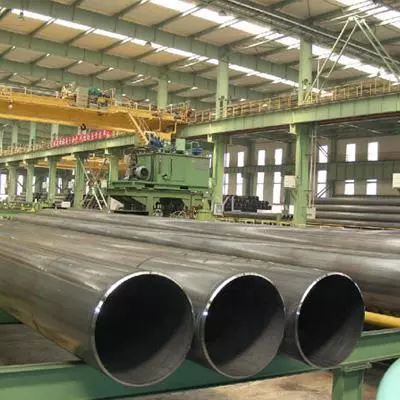What is a welded steel pipe?
Welded steel pipes are also known as welded pipes, which can be divided into longitudinal welded pipe and spiral welded pipes according to the type of weld joint; or furnace butt weld pipes, electric welded pipes (electric-resistance welding), and automatic arc welded pipes by welding techniques; circular welded pipes and special-shaped (square, flat, etc.) pipes by their end shapes. The production processes of this kind of pipes are uncomplicated: a steel plate or a steel belt being rolled and formed into the required shape, then welded into a pipe. Moreover, they have other advantages such as high efficiency of manufacturing, complete specifications, and relatively low cost. But welded steel pipes also have disadvantages like low intensity compared to seamless steel pipes.
Since the 1930s, as the development of high-quality strip rolling production and the improvement of welding techniques, testing technology, the quality and variety of welded pipes are continuously improved and increased. In more and more fields, seamless steel pipes have gradually been replaced by welded steel pipes.
Depending on different materials and applications, welded pipes can also be divided into the following kinds:
Welded steel pipe for low-pressure liquid delivery (GB/T3092-1993)
This kind of welded steel pipes are also called general welded pipes, or black pipes, which are used for transporting low-pressure fluids such as water, gas, air, oil, or other applications. They can be categorized into regular steel pipes and thickened steel pipes according to the thickness of pipes; or pipes without thread (bare pipes) and threaded steel pipes by connecting types. The nominal diameter (mm) is the standard size for pipes. Other than being used for conveying fluids, welded steel pipes are also heavily used as the pipes to be coated for galvanized welded steel pipes.
Galvanized welded steel pipes for low-pressure liquid delivery (GB/T3091-1993), also known as galvanized steel pipes, are hot-dipped galvanized welded pipes for transporting low-pressure fluids such as warm steam, water, gas, oil.
Plain carbon steel pipes for electric wire (GB3640-88) are used for protecting wires in industrial and civil construction, electrical installation engineering like installing machinery and equipment.
Electric resistance welding (ERW) pipes (YB242-63) are a kind of pipes whose weld joint is in parallel with the longitudinal direction of pipe, including metric electric welded steel pipes, electric thin-walled pipes, oil cooling service pipes for transformers, etc.
Spiral submerged arc welded (SSAW) steel pipes (SY5036-83) for conveying pressurized fluids such as oil, natural gas are reliable and safe since they will be inspected and tested rigorously. Besides, they have exceptional pressure bearing capacity and welding performance, as well as high conveying efficiency, low cost for installing pipeline because of their large diameter.
Just like SSAW steel pipes, spiral sewed high frequency welded steel pipes for conveying pressurized fluids have good pressure bearing capacity and plasticity.
Spiral submerged arc welded (SSAW) steel pipes (SY5037-83) for conveying low-pressure fluids are used for conveying water, gas, air, steam, etc.
Spiral sewed high frequency welded steel pipes for conveying low-pressure fluids use hot rolling steel coils as pipe blank.

Since the 1930s, as the development of high-quality strip rolling production and the improvement of welding techniques, testing technology, the quality and variety of welded pipes are continuously improved and increased. In more and more fields, seamless steel pipes have gradually been replaced by welded steel pipes.
Depending on different materials and applications, welded pipes can also be divided into the following kinds:
Welded steel pipe for low-pressure liquid delivery (GB/T3092-1993)
This kind of welded steel pipes are also called general welded pipes, or black pipes, which are used for transporting low-pressure fluids such as water, gas, air, oil, or other applications. They can be categorized into regular steel pipes and thickened steel pipes according to the thickness of pipes; or pipes without thread (bare pipes) and threaded steel pipes by connecting types. The nominal diameter (mm) is the standard size for pipes. Other than being used for conveying fluids, welded steel pipes are also heavily used as the pipes to be coated for galvanized welded steel pipes.
Galvanized welded steel pipes for low-pressure liquid delivery (GB/T3091-1993), also known as galvanized steel pipes, are hot-dipped galvanized welded pipes for transporting low-pressure fluids such as warm steam, water, gas, oil.
Plain carbon steel pipes for electric wire (GB3640-88) are used for protecting wires in industrial and civil construction, electrical installation engineering like installing machinery and equipment.
Electric resistance welding (ERW) pipes (YB242-63) are a kind of pipes whose weld joint is in parallel with the longitudinal direction of pipe, including metric electric welded steel pipes, electric thin-walled pipes, oil cooling service pipes for transformers, etc.
Spiral submerged arc welded (SSAW) steel pipes (SY5036-83) for conveying pressurized fluids such as oil, natural gas are reliable and safe since they will be inspected and tested rigorously. Besides, they have exceptional pressure bearing capacity and welding performance, as well as high conveying efficiency, low cost for installing pipeline because of their large diameter.
Just like SSAW steel pipes, spiral sewed high frequency welded steel pipes for conveying pressurized fluids have good pressure bearing capacity and plasticity.
Spiral submerged arc welded (SSAW) steel pipes (SY5037-83) for conveying low-pressure fluids are used for conveying water, gas, air, steam, etc.
Spiral sewed high frequency welded steel pipes for conveying low-pressure fluids use hot rolling steel coils as pipe blank.


